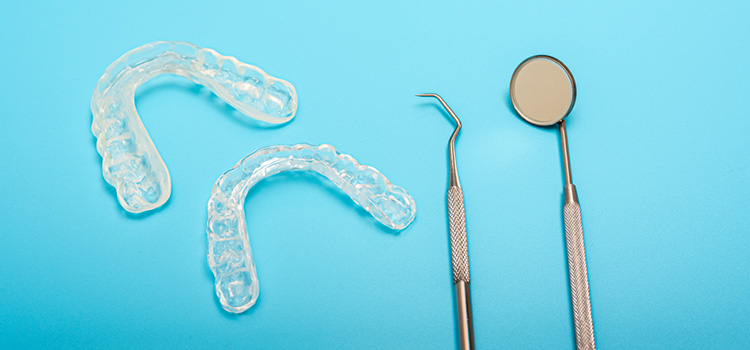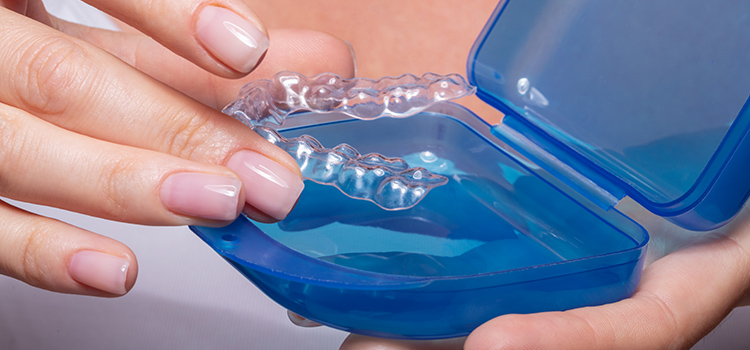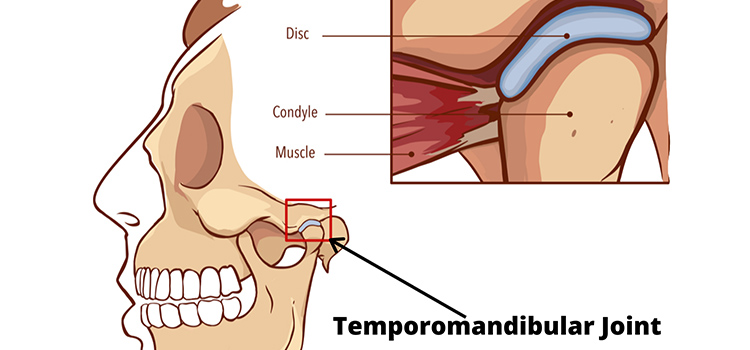Temporomandibular joint disorder, commonly known as TMJ or TMD, is a condition caused by dysfunction of the jaw joint, resulting in pain and discomfort. TMJ disorder is often difficult to diagnose, because the symptoms can appear unrelated to one another and they occur gradually. Fortunately, TMJ mouth guard is considered a reliable treatment for TMJ. Mouth guard or night guard for TMJ is a recommended course of treatment for this condition.
The TMJ Association estimates that at least 12% of the adult population and between 10 and 35 million people in the U.S. suffer from TMJ. Although, the number is most likely even higher due to the amount of undiagnosed cases. Interestingly, TMJ is much more common in women than men.
So, how does the mouth guard for TMJ work? Where can you get one? How long will it take for the mouthguard to be effective? And, how much do they cost? In this article we are going to give clear answers to these questions.

- Most Popular
- Hard Outside, Soft Inside
- 2MM Thick
- Moderate / Heavy

- Most Durable
- Hard Materials
- 1.5MM Thick
- Heavy / Severe

- For Day Time Use
- Thin, Barely Visible
- 1MM Thick
- Light / Moderate

- For Clenching
- Flexible & Soft
- 1.5MM Thick
- Light / Moderate
Mouthguards for TMJ Treatment
A TMJ mouth guard, also commonly referred to as a night guard, dental guard, bite guard, or occlusal splint, is a great option for treating TMJ because it will protect the teeth and jaw to relieve pain and prevent future injury. A study conducted in 2016 found that a TMJ guard protects the jaw by preventing teeth clenching as well as prevents possible future injury to the jaw and head (Tanaka et al., 2016). This non-surgical form of treatment is a non invasive and a simple way to release the painful pressure in your jaw. While it cannot cure TMJ, it will make you more comfortable by alleviating your pain.
How Does a TMJ Mouth Guard Work?
The mouthguard effectively treats TMJ by doing the following:
- Adjusts teeth and jaw to correct your bite
- Prevents Bruxism, or teeth grinding/clenching
- Assists the facial muscles to relax
- Prevents the jaw from locking/clicking

How Long Does it Take For the Mouthguard to Help TMJ?
When you begin to wear your mouthguard, you should experience some pain relief right away, though it will not vanish all at once. Some people feel complete relief within one month of having a custom fit mouthguard, but the timeline of relief will vary based on the cause of your TMJ. A study conducted on patients with TMJ who used a stabilization splint found that splint therapy was remarkably successful after 6 to 12 months of consistent use (Akbulut et al., 2018). It is imperative that you wear your mouthguard as advised by your dentist for quickest relief.
By the end of 12 months, 84% of patients were pain-free.
Custom Fitted TMJ Mouth Guards
A mouthguard for TMJ will readjust your teeth and jaw to relieve the pressure and soothe the pain in your teeth, jaw, head, etc. A custom fit nightguard is the best option to ensure that your TMJ is treated in the safest, fastest, and most comfortable way possible.
We strongly recommend consulting your dentist for a mouthguard to treat TMJ disorder rather than ordering a guard online. The dentist will take an impression of your teeth to create a mouthguard of the right fit and features to treat your specific condition. Every mouth is different, and a fitted mouthguard reflects that. One size does not fit all! The custom fitted mouthguard will ensure that you do not cause further damage to your teeth and jaw.
Which TMJ Mouth Guard is Right for You?
The material, shape, and size of a mouth guard for TMJ depends on your specific needs. There are mouthguards for everything from light grinding to heavy grinding/clenching, daytime vs. nighttime grinding, upper vs. lower mouthguards, and hard vs. soft materials.
Additionally, there are different mouthguards for stabilization and repositioning. The best mouthguard will depend on your symptoms as well as the cause of your TMJ. Some of the most common models include the NTI-TSS, stabilization splint, and repositioning splint.
- NTI-TSS
The Nociceptive Trigeminal Inhibition Tension Suppression System (NTI-TSS) is a small oral appliance made of resin or acrylic which is worn on the two front teeth. The NTI-TSS will not allow you to grind or clench the top and bottom teeth. NTI night guard is effective in relieving headaches and migraines because it relaxes the jaw and prevents contact with the upper and lower teeth.
- Stabilization Splint
Steven R. Hagerman, DDS explains that a stabilization splint covers the teeth to prevent grinding and assists in relaxing the jaw. It protects tooth enamel but does not prevent clenching. This kind of splint is also used in patients with bruxism who suffer from teeth grinding.
- Repositioning Splint
The repositioning splint works by moving the lower jaw (also known as the mandible) forward or backwards. This releases pressure in the jaw caused by TMJ and corrects misalignment.
There are many options for mouth guards and TMJ does not have a one-size-fits-all solution. It is best to speak with your dentist about treatment options to ensure you get a high-quality mouth guard of the correct fit and material. Your dentist will also be able to provide you with information that can alleviate any stress brought on by the overwhelming number of products available.

Cost of TMJ Mouth Guards
While prices are subject to vary, you can expect a custom mouthguard from the dentist to cost $500 or more. While this is the most costly option, it is also the safest way to protect your jaw and mouth. Other options include a custom fit night guard from an online retailer, which usually costs between $100-$200. Additionally, you can purchase over-the-counter mouth guards or “one size fits all” mouth guards for $10-$15. While this is the cheapest option, you are risking further damage by using a night guard for TMJ that may not fit you well. Before you decide on a mouth guard for TMJ, visit your dentist to talk about options and best courses of treatment.
Related Articles:
Signs and Symptoms of TMJ
TMJ is a result of dysfunction of the jaw joint, which causes pain in the joints and muscles connected to the jaw. The temporomandibular joint connects your jaw bone to your skull, so a problem with the joint can lead to several areas of TMJ pain and discomfort. Symptoms of TMJ include:
- Pain/aching around the ear
- Pain while chewing
- Facial pain
- Locking/clicking of the joint
- Difficulty opening/closing mouth
You may be asking yourself, “What did I do to deserve this?”. There are many factors that can potentially cause TMJ:
- A direct injury to the joint
- Excessive stress on the jaw muscles, which can be caused by bruxism
- Arthritis
- Tumors
- Genetics
- Abnormal bite or teeth alignment
It is highly recommended that you speak with your dentist about any concerns regarding TMJ. Your dentist will be able to identify if you have TMJ and analyze the severity to recommend the best treatment. You want an accurate diagnosis from your dentist before proceeding with treatment.

Alternative Treatments for TMJ
While night guards are perhaps the most common form of treatment, there are other options for treating TMJ.
- Heat and Cold Treatments: Applying heat or ice to the side of the jaw can reduce pain and inflammation.
- Medication: Over the counter medications can reduce pain. Additionally, a dentist may prescribe medications for immediate pain relief.
- Physical Therapy: Exercises and stretches can be helpful in strengthening the jaw muscles.
- Surgery: In more extreme cases, when other possibilities have been exhausted, surgery may be necessary.
Keep in mind, it may take more than one try to get the right treatment plan. Your dentist will have the most knowledge about which form of treatment is going to correct your jaw and relieve your pain. Visit Mayo Clinic for more information about alternative treatments.
TMJ vs. Bruxism
You may have heard the term “bruxism” used interchangeably with TMJ. In fact, bruxism can actually cause TMJ disorder. Bruxism is the grinding and clenching of the teeth which can lead to tooth pain and sensitivity, jaw pain, headaches, earaches, and fatigue from lack of sleep. Similarly to the mouthguard for TMJ, the guard for bruxism will alleviate pain by helping to release jaw clenching and cushion the muscles. Additionally, it will provide a barrier between the teeth so that you are unable to grind and clench your teeth. However, night guards for bruxism can be purchased online easily because they aim to provide a barrier between the teeth, rather than to reposition the jaw and bite.
Related Articles:

- Most Popular
- Hard Outside, Soft Inside
- 2MM Thick
- Moderate / Heavy

- Most Durable
- Hard Materials
- 1.5MM Thick
- Heavy / Severe

- For Day Time Use
- Thin, Barely Visible
- 1MM Thick
- Light / Moderate

- For Clenching
- Flexible & Soft
- 1.5MM Thick
- Light / Moderate
Sources:
- ASA Authors & Reviewers Sleep Physician at American Sleep Association Reviewers and WritersBoard-certified sleep M.D. physicians. Bruxism - Teeth Grinding Symptoms, Treatment & Causes. American Sleep Association, https://www.sleepassociation.org/sleep-disorders/more-sleep-disorders/bruxism/
- Hagerman Steve (2017). How Night Guards Can Help Prevent TMJ. https://www.hagermandentalcare.com/2017/11/18/how-night-guards-can-help-prevent-tmj/
- Kilic Kerem, Eraslan Ravza Kurtulus, Leblebicioğlu Ikbal (2018). Comparison of the Efficacy of Two Different Types of Splint Used in Patients with Temporomandibular Joint Disorders. BioMedical Journal of Scientific & Technical Research, vol. 6, 1-8, DOI: 10.26717/BJSTR.2018.06.001342
- Maeda Yoshinobu, Tanaka Yuto, Tsugawa Tsuyoshi (2016). Effect of Mouthguards on Impact to the Craniomandibular Complex. Dental Traumatology, 33(1), 1-6. https://doi.org/10.1111/edt.12283.
- Nihat Akbulut, Ahmet Altan, Sibel Akbulut, Cemal Atakan (2018). Evaluation of the 3 mm Thickness Splint Therapy on Temporomandibular Joint Disorders (TMDs). Pain Research and Management, vol. 2018, 1-7, Article ID 3756587.https://doi.org/10.1155/2018/3756587.
- Pruthi Sandhya et al. (2018). TMJ Disorders. https://www.mayoclinic.org/diseases-conditions/tmj/diagnosis-treatment/drc-20350945
- TMJ Associates Writers (2021). TMJ Basics.The TMJ Association. https://tmj.org/living-with-tmj/basics/